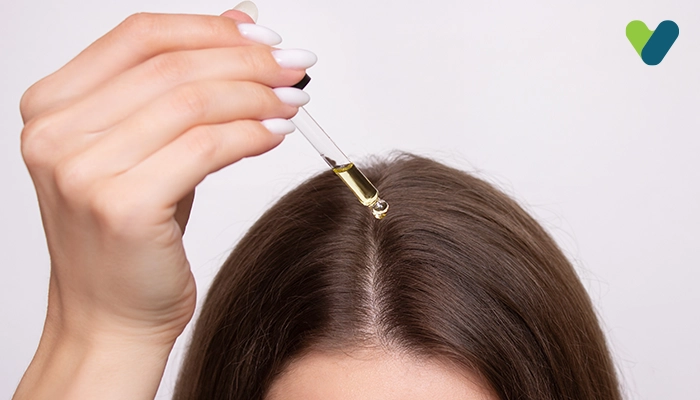Amy Chang's long, black hair has always fallen beyond her shoulder since third grade, and her hair became an afterthought due to keeping it consistent. She was oblivious to it. She'd dye it a darker shade of black every other month. She'd blow it out almost every day and use any hair treatments she could find. Chang would even forgo conditioner on occasion.
One of the most essential and divisive vitamins for hair health is vitamin A. The reason for the debate over vitamin A is that, although little quantities may promote hair development, high levels can produce scalp oil problems, leading to hair loss. It implies that moderation is key when it comes to vitamin A: you'll want to obtain enough to get all of the hair-growth advantages without going overboard and risking thinning. Vitamin A is advised at 900 micrograms per day for males and 700 micrograms for women.
If you keep to this dosage, you may anticipate all the advantages without scalp oil issues or hair thinning. Vitamin A is required for healthy immunological function, eyesight, and cell development. It's also important for the health and operation of your internal organs, such as your heart, lungs, and kidneys.
Vitamin A is necessary for developing your hair, skin, and nails because of its function in cellular growth. Because vitamin A insufficiency is rare in industrialized nations, supplementing with the vitamin is typically unnecessary if you haven't seen any deficiency symptoms.
If you opt to supplement your vitamin A, be careful not to overdo it. Consume no more than the quantity of vitamin A in most multivitamin pills since too much might cause shedding.
Can Excessive ‘Vitamin A’ Cause Hair Loss?
Vitamin A is a vital component for the human body, with several ramifications. Vitamins for hair loss are necessary for the body's immune systems to work correctly and have normal eyesight. Vitamin A also helps keep healthy skin, teeth, hair, bones, and organs, including the lungs, liver, and kidneys.Although Vitamin A is an important element of a healthy and balanced diet, it should be used in moderation; just because it is a Vitamin does not imply that taking too much is harmless. It is possible to overdose on Vitamin A, with potentially fatal consequences.
Vitamin A is a potent antioxidant with various beneficial characteristics for your health. On the other hand, the World Health Organization cites "alopecia" as a symptom of chronic Vitamin A poisoning. It may happen if you take too many supplements containing this mineral.
Excess Vitamin A is also one of the most major hazardous chemicals implicated in the development of alopecia, according to a 2018 study that reviewed 47 previous research studies on the subject. It is not to argue that Vitamin A is a poison in and of itself, but it may act like one if consumed in large quantities. Hypervitaminosis A is the medical term for this condition. In other words, too much Vitamin A may lead to various issues, including hair loss. They over why too much Vitamin A is unhealthy for you and your hair in this article.
Isn’t Vitamin a Supposed to Promote Hair Growth?
Vitamin A for hair growth is necessary for hair health. It heals it and keeps the scalp moisturized. Vitamin A is used in many hair loss remedies because it encourages hair growth. Furthermore, research has shown that beta-carotene, one of two types of Vitamin A, has anti-inflammatory qualities that are especially useful to people with Alopecia Areata.Too much Vitamin A, on the other hand, Vitamin A may be harmful to both the hair and the body. The hair follicles will go into overdrive if you take too many Retinol pills over a lengthy period. It indicates that your hair will reach the end of its development phase prematurely and fall out. Hair thinning and, in extreme instances, baldness may occur if your body is unable to produce new hair rapidly enough to replace it.
Vitamin A is a fat-soluble vitamin, which may accumulate in the body and be stored in the liver. Sickness, dry skin, impaired eyesight, and irritability are all frequent side effects of too much Vitamin A. If you continue to overdose, you risk developing osteoporosis, internal organ damage, and, if you're pregnant, birth abnormalities (Almohana).
How to Proceed if Vitamin a Is Causing Hair Loss?
If you suspect you have lost some hair due to taking too much Vitamin A, you should stop taking it or substantially limit your consumption. Because vitamin A is stored in the liver, your body will need to use up all of the reserves before you can take any more. If you've been taking a supplement, it's possible that getting your Vitamin A from meals would suffice until your body's reserves are depleted, and normalcy is restored. Your hair should regrow normally after your nutrition levels have been balanced.If your hair loss is caused by anything else, too much Vitamin A might exacerbate the condition. In this instance, you should consult with your doctor to determine the reason for your hair loss and the best course of treatment.


